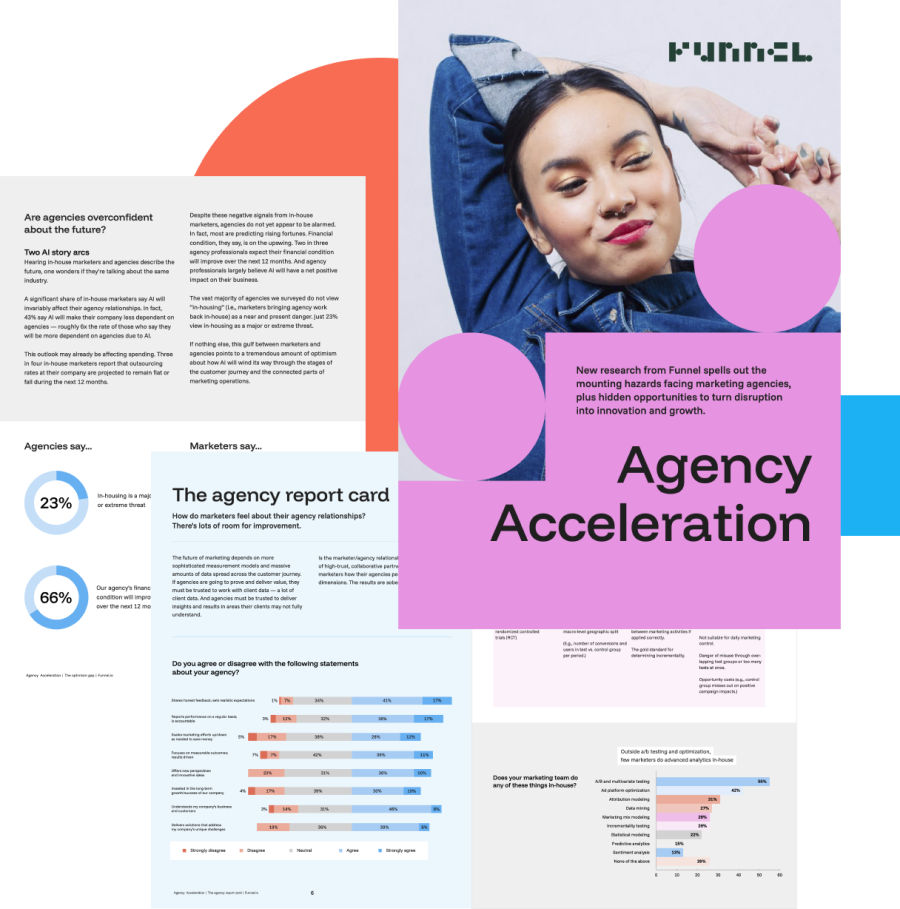-
 Written by Sean Dougherty
Written by Sean DoughertySenior Brand Creative at Funnel, Sean has more than 15 years of experience working in branding and advertising (both agency and client side). He's also a professional voice actor.
It’s hard out there for marketing agencies. For years, they have been facing stiffer competition and budget pressures. More recently, they’ve had to contend with seismic shifts in how media is purchased and how they can leverage data.
Add to that, due to a shift toward client-side zero-party data and the growing effectiveness of AI, it’s easy to see how the industry is feeling the pinch.
According to our recent research report, 43% of in-house marketers said AI tools will make them less reliant on agencies going forward. Plus, 75% said their agency spending would remain flat or fall over the next year.
But it might not be total doom and gloom for agencies. They can still bring a wealth of value and hard-won expertise to the table. Let’s explore how they can survive (and even thrive) in today’s complex marketplace.

Click the button below to download your copy of Agency Acceleration and learn how agencies need to position themselves for the future.
Schedule your free demo
Attracting and deploying top talent
One of marketing agencies’ core strengths is their ability to attract and retain top-tier talent. Agencies employ highly specialized professionals in areas like creative design, content creation, data analysis, SEO and digital strategy, which are often difficult for brands to cultivate in-house. This talent pool offers a diverse set of skills and perspectives that are hard to replicate (and pay for) in a single in-house team.
Marketing agencies also offer their talent the opportunity to work on a variety of projects and industries, which helps keep their skills sharp and up to date with the latest trends and tools. That includes keeping up with AI-powered tools.
That’s right. Agencies also have access to the most advanced marketing tools. And many of the people at those agencies probably work with those tools daily across various businesses.
And those AIs tools still require human oversight, creativity and strategic insight. Agencies can provide the creative muscle that enhances AI-generated insights and produces high-quality, brand-consistent content.
Scalable cost structures
Despite clients’ complaints of ballooning fees, marketing agencies are still a cost-saving endeavor – especially for small- to mid-sized businesses. Imagine a 15-person marketing team for a mid-sized business. They likely manage a full slate of always-on projects that prevent them from exploring new opportunities or even scaling existing tactics.
The talent pool an agency can provide is much more agile to a project’s or campaign’s needs than an in-house team could ever be.
Did an insight from your performance data signal the need to produce more YouTube videos? An agency could quickly reallocate its existing resources to support that opportunity — no need for lengthy and costly recruitment processes.
And with AI enabling greater automation of routine tasks (such as data analysis or content generation), agencies can focus on high-value, strategic work. By integrating AI into their workflows, agencies can deliver more output at lower costs, increasing the value they provide to clients while improving efficiency.
The power to scale marketing efforts
Scaling is a critical advantage for marketing agencies. Whether it’s a global product launch or a large-scale rebranding campaign, agencies can expand their operations quickly and efficiently to meet client needs. In-house teams, on the other hand, may struggle to scale without increasing headcount, which can be costly and time-consuming.
Agencies bring a wealth of resources, from cutting-edge tools and technology to established vendor relationships, that allow them to scale campaigns seamlessly across different markets and channels. Their experience in working with multiple clients simultaneously means they are adept at managing complex, multi-channel campaigns, coordinating across teams and executing at speed.
AI is also enhancing agencies’ ability to scale. For example, AI-driven analytics platforms enable agencies to monitor campaign performance in real time, optimizing ads, content and strategies on the fly. This allows agencies to execute large-scale campaigns with precision, ensuring that each touchpoint is finely tuned to meet the client’s objectives.
Diverse perspectives and experience
Diversity of ideas is the real secret sauce for a marketing agency. Their ability to work with a variety of business models and industries affords them a unique perspective that in-house teams can’t hope to match.
For instance, imagine a boutique 20-person digital agency. They specialize in consumer brands, but also work with some hospitality firms. Even their consumer brand experience will offer incredible insights into different business models — from disruptive skin care lines to well-established footwear companies. Adding their hospitality experience may give them a perspective on shifting spending patterns.
They can then pass on these insightful tips to clients to help them further refine their marketing strategies.
Agencies are also skilled at adopting a fresh, external view of a brand’s challenges. When working in-house, it’s easy for teams to become insular, focusing on incremental improvements and internal processes. Agencies bring a new lens to the table, challenging assumptions and offering creative, out-of-the-box solutions informed by their work with other clients and industries.
The rise of AI doesn’t diminish the need for diverse perspectives; instead, it amplifies the importance of creative problem-solving. While AI can analyze data and predict trends, it takes human intuition and experience to develop innovative strategies that stand out in a crowded marketplace. Agencies thrive in this role, using their broad experience to interpret AI-generated insights and create bold, memorable campaigns that resonate with audiences.
Providing strategic partnerships and expertise
Marketing agencies often serve as strategic partners for their clients, offering tactical execution alongside long-term planning and consultation. While AI can generate insights, agencies provide the strategic context needed to turn those insights into actionable, effective marketing plans.
Agencies also work with a wide range of third-party vendors and providers. As such, they can advise their clients on what partners, technologies and tools will yield the greatest return. And when it is time to spend, agencies can leverage existing vendor relationships to secure the best pricing and highest quality execution.
For instance, a client may want advice from their agency on how to improve their data processes in the hopes of running some marketing mix modeling one day. As an agency that has tried lots of different options, they can recommend (with confidence) a solution that meets the budget, support, scalability and capacity needs of their client.
The role of creativity in a data-driven world
While new technologies and techniques are once again uprooting the marketing industry, creativity remains the driving force behind successful marketing. The rise of AI might automate certain tasks, but it doesn’t replace the need for human creativity, empathy and storytelling. Agencies are experts at blending data with creativity to craft compelling narratives that connect with consumers on an emotional level.
According to our research, many agency leaders believe AI will positively impact their firms, with two-thirds believing their financial conditions will improve over the next few years.
The combination of AI and creative storytelling offers a new frontier for agencies. While AI can automate and quickly serve up insights from vast amounts of data, it still requires a creative storyteller who lives the human experience to make it come to life for audiences. Creative execution remains the domain of human ingenuity. Agencies that harness AI to enhance creativity rather than replace it will thrive in the new marketing landscape.
Adapt, evolve and thrive
The rise of AI and zero-party data’s importance has undoubtedly changed the marketing landscape over the past couple of years. However, opportunity still awaits agencies bold enough to adapt and take it. By attracting top talent, providing scalable and efficient solutions, offering diverse perspectives and maintaining a strong focus on creativity and strategic partnership, agencies can continue to deliver unparalleled value to their clients.
Rather than viewing technology as a threat, forward-thinking agencies will embrace these tools as opportunities to innovate and enhance their service offerings. In a world where marketing is becoming more data-driven, the role of agencies in interpreting data, crafting creative campaigns and scaling efforts remains as crucial as ever.
Sure, many struggling or mediocre agencies and those resistant to change will fall by the wayside. But those who make it will find themselves in a whole new world of creative and strategic possibility.
To learn more about how agencies can thrive in this new marketing era, download our Agency Acceleration report today.
Read next: 9 client reporting best practices
-
 Written by Sean Dougherty
Written by Sean DoughertySenior Brand Creative at Funnel, Sean has more than 15 years of experience working in branding and advertising (both agency and client side). He's also a professional voice actor.
